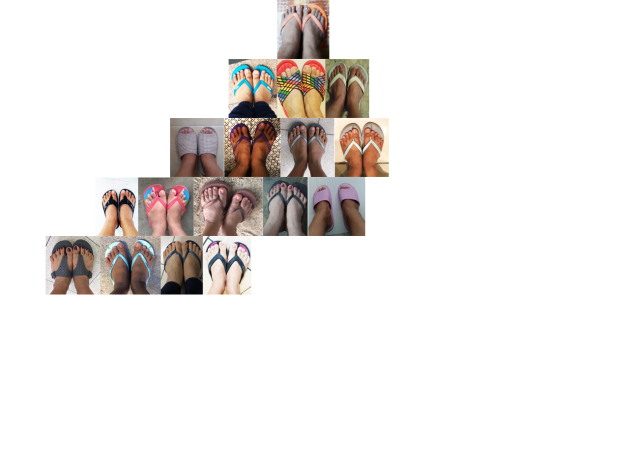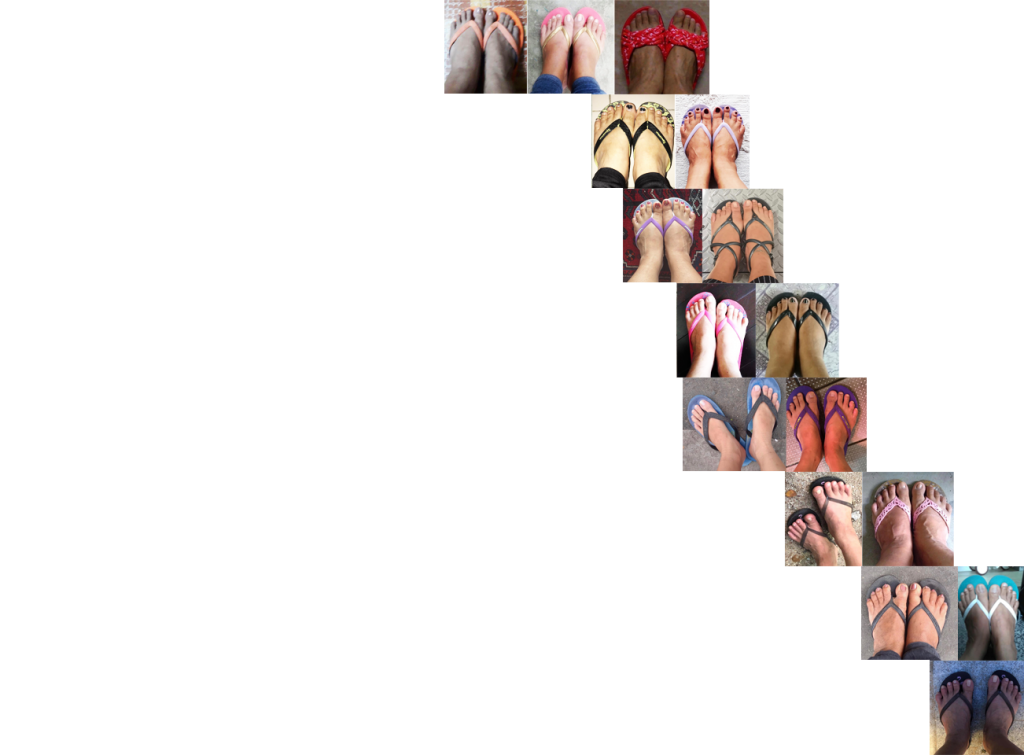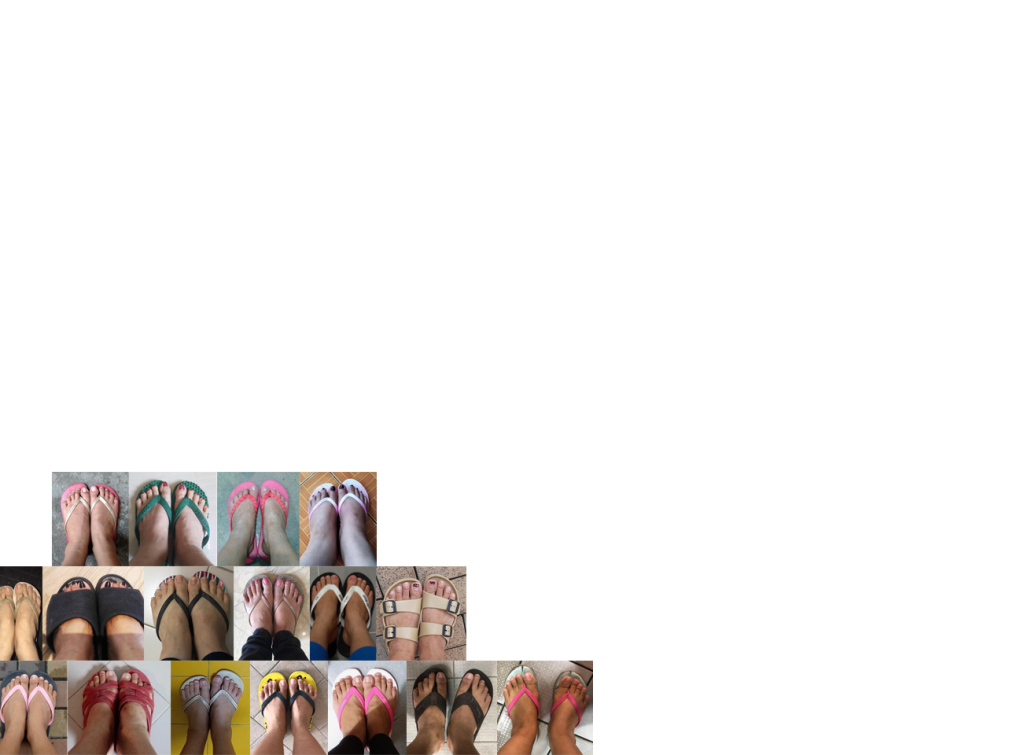The slippers allowed her the pleasure of spatial recognition, an opportunity to go back in time and become the person cared for, rather than the one perpetually burdened with the responsibility of caring.

September 5, 2019
Slippers are home, and when home is a photograph buried in a closet, slippers are desire, are secrets, are vestiges of the past, are the only thing she won’t give you. In this second installment of the Transpacific Literary Project’s Slipper folio, Ji Hyun Joo’s short fiction is a careful exploration of the emotional terrain of ingratitude and love.
You were fourteen years old when you learned Grandma was a person, like you, your dad, and your brother. Intellectually, you knew Grandma was another human being, a firm heart that probably looked similar to yours beating inside of her and pumping blood throughout her stout frame, but you associated personhood with emotion, and you’d never seen Grandma bare her soul in the way normal people do. You knew you weren’t allowed to tell anyone about what happened between you two. You and Grandma treated the incident like moldy bread sitting at the back of the fridge behind tall cartons of juice and milk, bothering no one in particular, but rotting more and more by the day. When the two of you sat together with no one else in the house, you felt the tension permeate and stain the air around you. Sometimes, it seemed like she wanted to scoot her chair a few feet away from you. You couldn’t blame her. You were the only one in the world that witnessed Grandma reduced to a little girl like wood whittled into a delicate, foreign shape.
You had everything, but you were greedy for Grandma’s things too. You were used to Grandma moving the juiciest piece of steak from her plate to yours and warming your little feet with her scratchy hands to keep the blood circulating until you fell asleep. Her entire schedule revolved around you, your brother, and your dad. She had food ready for when you came back home from school at 2:30, then again for your brother at 4:00, then again for your dad at 8:00. She made sure you were never without clean underwear. You didn’t even have to tell Grandma you were on your last pair; she seemed to have your underwear inventory logged in her mind, checking off the days since she last did laundry. You used to thank her for all she did for you, but your thank you sounded worn and disingenuous as you began to see Grandma as someone that was put on this earth just for you. You were fully aware of how privileged you were, but you were too young to call it by its name. You simply identified yourself as the person who took and Grandma as the one who gave.
Grandma’s seventh sister used to send her boxes of beautiful fabric house slippers from Korea between 1995 to 1999. Opening the heavily taped boxes with a kitchen knife were the rare occasions you saw Grandma’s cheeks flush with anticipation. Grandma received one box at the beginning of the year. There were always 20 pairs of slippers wrapped in brown butcher paper and held together with two strings of rope. After cutting through the coarse string, Grandma held the slippers in her hands for a moment, observing the never-changing floral designs. She then color coordinated the slippers (light yellow, neon yellow, navy blue, baby blue, hot pink) and displayed them on the top shelf of her walk-in closet.
When you looked at Grandma’s feet, you estimated they were a similar size to yours, but she never offered you a pair from her collection. Instead, she kept them as far out of your reach as possible, making you all the more curious about their texture and how the delicate fabric would feel wrapped around your feet.
Grandma wore the same outfit every day. The uniform she felt was most optimal for all the housework she did to keep your home running: loose floral sweatpants and a teal cotton t-shirt from GAP. The change in slipper color and pattern signaled a new day. In the fall of 1996, you stood beside Grandma as she went about her morning ritual of picking a pair of slippers. In the mornings, she took her mug of chrysanthemum tea, yellow petals wilting to the bottom of the cup, and ran her fingers along the edge of each slipper. She picked so diligently, like one of those rich women in the Korean dramas she watched, running their fingers through mink coats and silk blouses as they contemplated how to best destroy their nemesis. When Grandma picked out the navy blue slippers spotted with white flowers, you reached out your hand to feel them, but she slapped right below your knuckles. A quick, rough slap, a simple reaction that hurt you more than intended. She swiftly put the slippers on her feet, grabbed the hand she slapped, and held it to her chest. Then, using the most elementary Korean, feigning simplicity of a complex language just for you, she told you a story. These slippers, she said, have been in my family since 1951 when my seventh sister was born. Her sister, like you, had terrible blood circulation throughout her body. To protect her youngest daughter’s chronically cold and itchy feet, Grandma’s mother used fabric from her own winter coat to make tiny house slippers. After the war, her family remained poor, but her mother was able to find fabric that was not already in the form of her own clothes, to make house slippers for her other six daughters. Long after their mother passed, Grandma’s seventh sister kept on the tradition, using high quality cotton fabric to make slippers for each of her older sisters. Grandma got ten more slippers a year than her other sisters, a special accommodation for being exactly 5, 730 miles away. The story, intended to turn your attention away from the sting pulsing through your hand, only made what was so strictly Grandma’s more desirable.
In the summer of 1999, the boxes of slippers stopped coming. Grandma found out her favorite sister was bedridden, cancer spreading mercilessly through both lungs. Her third sister sent her a letter detailing how close to death their dear sister was, along with a picture of her sleeping, a thick padded blanket covering up to her shoulders, revealing the sharp angles of two clavicles. Grandma glanced at the photo and left it facedown in her sock drawer. The photo still remains there facedown, but not forgotten.
Grandma didn’t go to the funeral, blaming the hike in plane ticket prices. Your dad kept the ticketing page open on his bulky laptop for five days, repeatedly telling her he knows she wants to go home. As if she had somehow been stripped and laid bare by this reveal of homesickness, Grandma grabbed the plaid blanket resting on the arm of the couch, wrapped it tightly around her shoulders, and said nothing.
The bottom of the fabric slippers wore down quickly due to the friction of the tiles and rough carpet. Grandma usually had to throw out a pair after about two or three months of use. She preserved the last ten pairs of slippers her sister sent her. She never spoke of them. She left them resting in her closet, acquiring dust in the dark alongside winter coats and crisp blouses that long forgot Grandma’s shape and scent.
From her obsession with house slippers, you would assume Grandma had the same passion for shoes, but she owned only three pairs: blue Nike running shoes, black flats, and pink flip flops. Grandma rarely left the house. Your dad went grocery shopping for the family twice a week, consulting a long list of items written in Grandma’s perfectly square handwriting. Grandma wrote everything in Korean. Even when she specified the oatmeal brand she wanted, she transformed Quaker into four boxy Korean characters. You didn’t possess this skill, the power to make two different languages melt into each other, and so you called it her superpower. Once every two days she would go out in her running shoes and walk around the block for an hour and a half. When she returned home, she took off her shoes at the front door, peeled off her damp socks, and slipped her feet into her slippers. Outdoor shoes were strictly for the dusty, unsafe, unpredictable outside world where Grandma was forced to navigate currents of people she shared not even the basic commonalities of language and food. Slippers reminded Grandma of the safety and warmth of home, not the home she has on a street with neighbors who keep asking how are you when they know she can only say good thank you, but the home she shared with her seven sisters, parents, and grandparents. The slippers allowed her the pleasure of spatial recognition, an opportunity to go back in time and become the person that is cared for, rather than the one that is perpetually burdened with the responsibility of caring.
When your dad noticed Grandma sewing the tiny holes that spotted the heels of her fabric slipper, he bought her a pair of hot pink ones from the Korean stationery store near the fish market in downtown Los Angeles. You thought the new slippers with the flimsy rubber soles and tiny plastic flowers on the sides were a cheap alternative to the handmade ones Grandma used to wear.
“Dad, the new slippers you got Grandma are hideous,” you said to your dad in the car, wondering if he was a man so dull to aesthetics, he simply didn’t know how ugly they were.
He sighed one of his deep exhausted sighs and said, “Those were the only ones I could find that weren’t for children. She likes them, Ewa. It’s fine.”
You knew it was impossible for her to like them because these slippers didn’t hug her feet like the ones she used to wear. Her feet were crushed into the absurdly narrow tip of the slipper, which was made of a hard plastic mesh. Grandma’s feet looked like they were fattened and caged like animals prepped for slaughter. Unlike her fabric slippers, she left the new ones right outside her bedroom door, opting to walk on the bare carpet in her room.
The only positive thing about the new slippers was that they were hot pink. Hot pink is Grandma’s favorite color. Despite the harmless smile that made all the wrinkles burrow deep into the crevices of her face, Grandma was a woman that popped, like hot pink. She had a temper, gifted to her from generations of ill-tempered women who had to cook and clean and raise children before they even stopped being children themselves. During occasional family outings, Grandma hid behind you after you outgrew her in the fifth grade. She sometimes clung to your arm when someone asked her a question she didn’t understand, unintentionally digging into your flesh in the hope that you would feel her desperation and answer instead. But within the confines of your box-like two-story house, you watched Grandma roam free like a wild animal unleashed from the zoo after decades in captivity, yelling at your dad and brother for leaving their socks strewn across the living room.
From what you heard of Grandma, she used to be a different woman. Her brilliant mind was built on a love of science. Knowledge and logic stacked atop one another like a perfectly lined box of Jenga. She majored in chemistry at one of the top universities in Korea. Your dad had mentioned the name of the university many times, but it never stuck. Grandma used to wear pantsuits that elevated her small frame, basking her in an Audrey Hepburn-type grace. Your dad showed you pictures of her posing at a school event and you stared at them for a good while, wondering whether you somehow contributed to Grandma’s demise. When your dad asked her to raise you and your brother in America after your mom left, she willingly traded in her finely built career and signature dark navy pantsuit for housewife hands that look like they’d been soaked in water for decades. Most of the time, Grandma was quiet, lost in thought as she laid out on the couch, looking at the light fixture attached high up on the ceiling.
The day of the incident started out like any ordinary Sunday afternoon. Your dad and brother went to the grocery store to pick up Grandma’s pick of ingredients for the next few days. You read a chapter of your fantasy novel, and as you did every Sunday, you sat in the tattered bean bag in the corner of your room and daydreamed. You heard clanking in the kitchen while Grandma prepared your favorite spicy noodles for lunch. Bored and curious, you wandered into Grandma’s room and threw yourself onto her bed. Grandma had a distinct scent to her that you loved. It was a scent difficult to describe, one of those complex smells that had a mix of everything. The salty warm scent of sesame oil and floral Bounty dryer sheets filled your nose as you buried your face in her pillow. You had the sudden urge to get to know Grandma better. Grandma never talked about herself and no one ever asked what she was feeling because everyone assumed she felt nothing, even when her favorite sister was eaten alive by cancer.
You opened her sock drawer and dug your hand in, moving your fingers like a claw until you felt the sharp corners of a photograph. You took out the photo of your seventh great aunt wrapped in a striped blanket like a burrito, face so tranquil it appeared she was ready to let go of everything in this world and cross over to the next. A flash was used to take this photo. You could tell from the way there was a spotlight on your seventh great aunt while the background remained dark and grainy. Whoever took the photo, probably your third great aunt (who doesn’t talk to Grandma anymore), wanted to magnify how her cheekbones were jutting out and the way the skin stretched to accommodate this new feature. Maybe the photographer thought this would bring Grandma back home, and when it didn’t, it said a lot of things about Grandma without her having to say a word.
You placed the photo back to the bottom of the sock drawer and wandered into her closet. On the left and right side hung garments wrapped in plastic. It reminded you of the inside of the fridge at the butcher shop your dad frequents to purchase pork. Long slabs of unidentifiable body parts hanging from hooks. Neatly folded sweatpants and cotton t-shirts were stacked in the center shelves for easy access. On the very top shelf, you found the last of the handmade slippers Grandma had saved. Wrapped tightly with two white shoelaces, they held the presence of precious items that are highly regarded, like fossils in a museum. You wanted to touch them, knowing that Grandma probably reached for them from time to time. You used the side shelves as stairs, crushing Grandma’s sweatpants under your feet as you climbed higher and higher. You grabbed onto the metal rod for support with your left hand while you reached around the top shelf with your right hand. As the cold fabric of the slippers met the tips of your fingers, you heard the whoosh of the closet door sliding open.
“Ewa!”
You jumped from the shelf and landed on top of a soft, plush body smaller than yours. Judging from the crack that broke your fall, you were certain you caused damage. Your eyes were closed, but you smelled the familiar smell of Grandma. You quickly crawled off to find a girl, about six or seven years of age, lying on the floor. The girl sat up abruptly, her spine pin straight, and looked at the carpet before her. As you fell, you had brought down the packet of slippers with you, breaking the shoelaces that had tightly wrapped them together. Blue, yellow, pink outlines of slippers illuminated in the dark like fallen flowers, waiting for the inevitable shrivel of their petals. One of the baby blue slippers had torn at its border after coming into contact with the jagged edge of a hanger.
The girl grabbed for the injured slipper, running a hand around the wound then looking at her finger as if to check for blood. The girl let out a shrill scream that filled the closet, making your eardrums pop then retract, then pop again. She cried large tears the size of mother cockroaches. She then grabbed you by the neck of your sweater and spoke to you in what you thought was a foreign language, only to realize it was Korean being spoken rapidly like a well-versed curse or prayer. The girl let go of you and gathered the fallen slippers into the tiny cave her short arms provided and threw them in your face like confetti. You heard another crack to find the girl had laid back down on the carpet, eyes closed, hands enclosed in one another, both resting on her chest near her heart. Her legs lay side by side. She looked like she had been forcefully thrown into a coffin, her eyes wide open, awaiting a death she didn’t deserve. You called for Grandma, but she didn’t answer. You put a hand over the girl’s shrunken chest in search of her heartbeat, but you couldn’t feel the rhythm you imagined would be encased in her body. You shook the girl. At first gently, then violently, rocking her body like a ship lost at sea. You waved a hand in front of her open eyes. You sat beside her for three minutes, then ten minutes, then another twenty minutes.
You heard the mechanical clicking of the garage door opening. You shook the girl by the shoulders again, wrinkling the sleeve of her t-shirt. The sounds of your brother and dad arguing traveled in quiet murmurs up to the closet, where you were kneeling beside the lifeless body. You placed a hand on the girl’s plump left cheek. Her skin was ice cold and as smooth as glass. You were overcome with the sudden realization that you, with your unrelenting need to tread into Grandma’s drawers, Grandma’s closet, Grandma’s life, dismantled Grandma’s only mode of survival. To be emotionless was to be numb to life’s continuous emptying of everything she loved, a sadistic process that would’ve left her immobile and desolate if she let it. You broke Grandma, making her feel the weight of everything she had lost.
You got on your hands and knees, gathering slippers with each stomp of your right and left hands. You stacked them one on top of the other, forming a miniature castle in the center of the girl’s chest. You placed your damp cheek on the girl’s stomach, darkening the teal of her shirt. You heard the muffled sounds of your dad heading up the stairs to Grandma’s room. You felt a hand on the back of your head, then another on your wet cheek. You opened your eyes and looked up to see Grandma holding you to her, blinking slowly and steadily as if she was waking from a bad dream. You buried your face in Grandma’s stomach and didn’t lift your head even when you heard your dad’s voice.
“What happened here? Ewa, are you okay?”
You wrapped your arms around the center of Grandma’s stomach and squeezed tight. She felt both dense and fragile, her frame sturdy against your forearms, but masked under a thin layer of skin that could no longer fully conceal the blue and purple veins that wrapped around Grandma’s arms like untamed vines. You selfishly clutched onto Grandma, tightening your grip around her, hearing the crunch of her bones like paper crumbling in your hands. Learning that she is breakable like everyone else was not enough for you. You needed to show that you loved her, that you could not live without her, so even as you heard the crackling of her disintegrating beneath you, you did not stop squeezing and squeezing.



